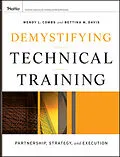Praise for Demystifying Technical Training "Demystifying Technical Training is a must-read for CLOs,managers of training, instructors, and instructional designers. Allwho read it will gain critical insights into how to lower the costand improve the efficiency and effectiveness of learning." --Wm. Douglas Harward, CEO and founder of TrainingIndustry, Inc. "Individuals interested in and accountable for derivingsignificant value from technical training investments will gaingreat benefit from reading this book and applying itswisdom." --Karen Kocher, CLO at Cigna Healthcare "Demystifying Technical Training is an essential,complete guide for any learning organization. The overviews andconcepts are clearly stated, while the case studies and sidebarsprovide practical examples you can apply in your situation." --Jean Barbazette, president of The Training Clinic andauthor of Managing the Training Function for Bottom-LineResults "Considering the cost of acquiring and developing talent, whywouldn't all CEO/COOs insist on investing in people to improveresults and reduce risk? This book demystifies the process ofdeveloping technical experts to increase the return on investmentin human capital. Bravo!" --Martin J. Menard, former group CIO at IntelCorporation "Technical training is a key to sustaining competitiveness inthe new economy. Learn how to leverage and optimize its value inyour organization through this wonderfully insightful and practicalresource." --Dr. Arthur L. Jue, director of global organizationand talent development at Oracle and co-author of Social Mediaat Work: How Networking Tools Propel OrganizationalPerformance "Don't be misled by the title--this book--whilefocusing on the often segmented world of domain specific jobskills--provides guidance valid for the full spectrum ofworkforce learning from soft-skills to 'technical' skills." --Ruth Clark, principal and president of Clark Training& Consulting and author of e-Learning and the Science ofInstruction
Autorentext
Wendy L. Combs, Ph.D., PMP, is a senior practitioner with an exceptional track record of building and developing global training teams to meet business goals and produce outstanding results. She previously worked in a technical training capacity at Intel Corporation, Cisco Systems, and Nortel Networks and is currently the vice president of Leadersphere. Combs is the coauthor of Instructional Design for Technical Training and The Targeted Evaluation Process.
Bettina M. Davis, MBA, is an accomplished executive with domestic and international experience directing and overseeing comprehensive human resources, training, and organization development functions and programs across large corporate environments. Before taking on the role as director of talent acquisition and talent management at Tektronix Corporation, she led employee training, including technical training, for Intel IT worldwide.
Klappentext
Praise for Demystifying Technical Training
"Demystifying Technical Training is a must-read for CLOs, managers of training, instructors, and instructional designers. All who read it will gain critical insights into how to lower the cost and improve the efficiency and effectiveness of learning."
Wm. Douglas Harward, CEO and founder of Training Industry, Inc.
"Individuals interested in and accountable for deriving significant value from technical training investments will gain great benefit from reading this book and applying its wisdom."
Karen Kocher, CLO at Cigna Healthcare
"Demystifying Technical Training is an essential, complete guide for any learning organization. The overviews and concepts are clearly stated, while the case studies and sidebars provide practical examples you can apply in your situation."
Jean Barbazette, president of The Training Clinic and author of Managing the Training Function for Bottom-Line Results
"Considering the cost of acquiring and developing talent, why wouldn't all CEO/COOs insist on investing in people to improve results and reduce risk? This book demystifies the process of developing technical experts to increase the return on investment in human capital. Bravo!"
Martin J. Menard, former group CIO at Intel Corporation
"Technical training is a key to sustaining competitiveness in the new economy. Learn how to leverage and optimize its value in your organization through this wonderfully insightful and practical resource."
Dr. Arthur L. Jue, director of global organization and talent development at Oracle and co-author of Social Media at Work: How Networking Tools Propel Organizational Performance
"Don't be misled by the titlethis bookwhile focusing on the often segmented world of domain specific job skillsprovides guidance valid for the full spectrum of workforce learning from soft-skills to 'technical' skills."
Ruth Clark, principal and president of Clark Training & Consulting and author of e-Learning and the Science of Instruction
Inhalt
Foreword.
Preface.
Acknowledgments.
Introduction.
Chapter 1: What Is Technical Training?
The Complete Training Suite for Technical Experts.
Technical Training Defined.
Technical Functional Training.
Personal Effectiveness Training.
Business Training.
Analogous Content Types.
Technical Training and Related Activities.
Product Development.
Customer Training.
Technology and Computer-Based Training.
Human Resource Generalist Work.
Summary: The Power of a Common Language.
Chapter 2: Challenges and Opportunities for Technical Training.
Environmental Factors.
Lack of a Common Understanding.
Evolution of Technical Training.
Perception Versus Reality of Technical Training.
The Need for a Strong Lobby.
The Impact of a Declining Economy.
Organizational Considerations.
Ownership of Technology and Enabling Activities.
Legitimacy of Technical Training.
Involvement in Technology Implementations.
The Role in Continuous Improvement Initiatives.
Capability Aspects.
The Tension Between Two Core Competencies.
Integration of Technical Training into Talent Management.
Availability of Career Paths for Technical Employees.
Skills Mastery Over the Course of a Career.
Summary: The Value Proposition for Technical Training.
Chapter 3: Differentiators of Technical Training.
What Are Differentiators?
Analysis.
Focus.
Trigger.
Planning Horizon.
Formal and Informal Learning.
e-Learning.
Design.
Availability of Content.
Granularity of Content and Audience Size.
Contextualization.
Coopetition.
Subject-Matter Expert (SME) Involvement.
Development.
Evolutionary Versus Revolutionary.
Refresh Cycles.
Standardization and Certification.
Implementation.
Learning and Unlearning.
Release Timing.
Volunteer Instructors (VIs).
Waterfall Deployment.
Evaluation.
Causality.
Measurability.
Consequence of Errors.
Escalations.
Overarching Differentiators.
Cost.
Expertise.
Trust.
Summary: The Potential of Differentiators.
Chapter 4: Stakeholders of Technical Training.
Technical Training Stakeholder Needs.
Executives Expect Tangible Outcomes.
Managers Want Skill Gaps Addressed.
Technical Leaders Need Support for Technology.
Technical Experts Want Accurate Content.
